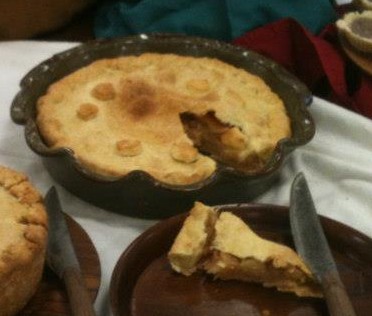Introduction:
Another dish from the first course of the Taming of the Shrew event, this dish was based on the dinner menu from April 8th.
First course from the credenza, item: Salted ham cooked in wine, served with sour oranges and sugar on top
Although Scappi did not provide a recipe for this dish, exactly, he did give some idea of how it might be made..
Scappi: Book 2, recipe 113-114:
113: … salami need to be served cold, if they are semi-salted, though, cook them and serve them as is directed in the recipe for them
114:… large salamis and prosciutto can be cooked in water and wine…when cooked they are left to cool in the broth where they were cooked
Scappi: Book 2, recipe 270: To prepare a sauce of orange juice and (lemon) juice: Get four ounces of (lemon) juice and a pound of bitter or semi-sweet orange juice and set the clearest of it to boil with a pound of fine sugar, a quarter ounce of whole cinnamon and two whole cloves. Give it the cooking set out in the previous recipe for the sauce of pomegranate wine so that it is reduced by two-thirds.
Discussion
- Technically, the recipe didn’t call for an orange sauce but for sour oranges to be placed on top – similar to lemons being used as a garnish elsewhere in the book. However, I can’t source fresh sour oranges, so I thought a sauce would be a close second and would also be a little bit more familiar to my audience.
- Sour orange juice is available bottled as it’s still a common ingredient in various Caribbean cuisines – I used the Iberia brand, I’ve also used the Badia one with no real difference. Technically, this one is a mixture of orange and grapefruit juice, mimicking the flavor of Seville orange juice; pure Seville orange juice is about three times the price of the substitute and I couldn’t fit that into this feast’s budget.
- The “cured pork” in this was a half prosciutto, bought as a “whole chunk” at a restaurant supply store. Cured hams like prosciutto have been made in Italy since well before Scappi’s time and something similar may have been what he referred to, though I have not tracked down a contemporaneous description of their preparation to compare with modern techniques.
- Scully translates limoncelli as lime. It literally means “little lemon”; I chose to use lemon as I agree with Helewyse de Birkstad’s analysis. (Smithson)
Sources:
1302597
{1302597:CTQP5R9M},{1302597:Q7K2UHLX}
1
modern-language-association
50
default
1394
https://www.erminespot.com/wp-content/plugins/zotpress/
%7B%22status%22%3A%22success%22%2C%22updateneeded%22%3Afalse%2C%22instance%22%3Afalse%2C%22meta%22%3A%7B%22request_last%22%3A0%2C%22request_next%22%3A0%2C%22used_cache%22%3Atrue%7D%2C%22data%22%3A%5B%7B%22key%22%3A%22Q7K2UHLX%22%2C%22library%22%3A%7B%22id%22%3A1302597%7D%2C%22meta%22%3A%7B%22creatorSummary%22%3A%22Smithson%22%2C%22parsedDate%22%3A%222009-03-01%22%2C%22numChildren%22%3A0%7D%2C%22bib%22%3A%22%3Cdiv%20class%3D%5C%22csl-bib-body%5C%22%20style%3D%5C%22line-height%3A%202%3B%20padding-left%3A%201em%3B%20text-indent%3A-1em%3B%5C%22%3E%5Cn%20%20%3Cdiv%20class%3D%5C%22csl-entry%5C%22%3ESmithson%2C%20Louise.%20%26%23x201C%3BLost%20in%20Translation.%26%23x201D%3B%20%3Ci%3ELost%20in%20Translation%3C%5C%2Fi%3E%2C%201%20Mar.%202009%2C%20%3Ca%20class%3D%27zp-ItemURL%27%20href%3D%27https%3A%5C%2F%5C%2Fwww.medievalcookery.com%5C%2Fhelewyse%5C%2FLost_in_Translation.html%27%3Ehttps%3A%5C%2F%5C%2Fwww.medievalcookery.com%5C%2Fhelewyse%5C%2FLost_in_Translation.html%3C%5C%2Fa%3E.%3C%5C%2Fdiv%3E%5Cn%3C%5C%2Fdiv%3E%22%2C%22data%22%3A%7B%22itemType%22%3A%22webpage%22%2C%22title%22%3A%22Lost%20in%20Translation%22%2C%22creators%22%3A%5B%7B%22creatorType%22%3A%22author%22%2C%22firstName%22%3A%22Louise%22%2C%22lastName%22%3A%22Smithson%22%7D%5D%2C%22abstractNote%22%3A%22%22%2C%22date%22%3A%223%5C%2F1%5C%2F2009%22%2C%22url%22%3A%22https%3A%5C%2F%5C%2Fwww.medievalcookery.com%5C%2Fhelewyse%5C%2FLost_in_Translation.html%22%2C%22language%22%3A%22%22%2C%22collections%22%3A%5B%2236TMQHXD%22%2C%22RMWLJW2M%22%5D%2C%22dateModified%22%3A%222024-06-08T14%3A47%3A29Z%22%7D%7D%2C%7B%22key%22%3A%22CTQP5R9M%22%2C%22library%22%3A%7B%22id%22%3A1302597%7D%2C%22meta%22%3A%7B%22creatorSummary%22%3A%22Scappi%20and%20Scully%22%2C%22parsedDate%22%3A%222008-12-15%22%2C%22numChildren%22%3A1%7D%2C%22bib%22%3A%22%3Cdiv%20class%3D%5C%22csl-bib-body%5C%22%20style%3D%5C%22line-height%3A%202%3B%20padding-left%3A%201em%3B%20text-indent%3A-1em%3B%5C%22%3E%5Cn%20%20%3Cdiv%20class%3D%5C%22csl-entry%5C%22%3EScappi%2C%20Bartolomeo%2C%20and%20Terence%20Scully.%20%3Ci%3EThe%20Opera%20of%20Bartolomeo%20Scappi%20%281570%29%3A%20L%26%23x2019%3BArte%20Et%20Prudenza%20D%26%23x2019%3BUn%20Maestro%20Cuoco%3C%5C%2Fi%3E.%20University%20of%20Toronto%20Press%2C%202008.%3C%5C%2Fdiv%3E%5Cn%3C%5C%2Fdiv%3E%22%2C%22data%22%3A%7B%22itemType%22%3A%22book%22%2C%22title%22%3A%22The%20Opera%20of%20Bartolomeo%20Scappi%20%281570%29%3A%20L%27Arte%20Et%20Prudenza%20D%27Un%20Maestro%20Cuoco%22%2C%22creators%22%3A%5B%7B%22creatorType%22%3A%22author%22%2C%22firstName%22%3A%22Bartolomeo%22%2C%22lastName%22%3A%22Scappi%22%7D%2C%7B%22creatorType%22%3A%22author%22%2C%22firstName%22%3A%22Terence%22%2C%22lastName%22%3A%22Scully%22%7D%5D%2C%22abstractNote%22%3A%22Bartolomeo%20Scappi%20%28c.%201500-1577%29%20was%20arguably%20the%20most%20famous%20chef%20of%20the%20Italian%20Renaissance.%20He%20oversaw%20the%20preparation%20of%20meals%20for%20several%20Cardinals%20and%20was%20such%20a%20master%20of%20his%20profession%20that%20he%20became%20the%20personal%20cook%20for%20two%20Popes.%20At%20the%20culmination%20of%20his%20prolific%20career%20he%20compiled%20the%20largest%20cookery%20treatise%20of%20the%20period%20to%20instruct%20an%20apprentice%20on%20the%20full%20craft%20of%20fine%20cuisine%2C%20its%20methods%2C%20ingredients%2C%20and%20recipes.%20Accompanying%20his%20book%20was%20a%20set%20of%20unique%20and%20precious%20engravings%20that%20show%20the%20ideal%20kitchen%20of%20his%20day%2C%20its%20operations%20and%20myriad%20utensils%2C%20and%20are%20exquisitely%20reproduced%20in%20this%20volume.Scappi%27s%20Opera%20presents%20more%20than%20one%20thousand%20recipes%20along%20with%20menus%20that%20comprise%20up%20to%20a%20hundred%20dishes%2C%20while%20also%20commenting%20on%20a%20cook%27s%20responsibilities.%20Scappi%20also%20included%20a%20fascinating%20account%20of%20a%20pope%27s%20funeral%20and%20the%20complex%20procedures%20for%20feeding%20the%20cardinals%20during%20the%20ensuing%20conclave.%20His%20recipes%20inherit%20medieval%20culinary%20customs%2C%20but%20also%20anticipate%20modern%20Italian%20cookery%20with%20a%20segment%20of%20230%20recipes%20for%20pastry%20of%20plain%20and%20flaky%20dough%20%28torte%2C%20ciambelle%2C%20pastizzi%2C%20crostate%29%20and%20pasta%20%28tortellini%2C%20tagliatelli%2C%20struffoli%2C%20ravioli%2C%20pizza%29.Terence%20Scully%20presents%20the%20first%20English%20translation%20of%20the%20work.%20His%20aim%20is%20to%20make%20the%20recipes%20and%20the%20broad%20experience%20of%20this%20sophisticated%20papal%20cook%20accessible%20to%20a%20modern%20English%20audience%20interested%20in%20the%20culinary%20expertise%20and%20gastronomic%20refinement%20within%20the%20most%20civilized%20niche%20of%20Renaissance%20society.%22%2C%22date%22%3A%222008-12-15%22%2C%22language%22%3A%22en%22%2C%22ISBN%22%3A%229780802096241%22%2C%22url%22%3A%22%22%2C%22collections%22%3A%5B%2236TMQHXD%22%2C%22UJBYGZAI%22%5D%2C%22dateModified%22%3A%222013-02-17T16%3A46%3A33Z%22%7D%7D%5D%7D
Smithson, Louise. “Lost in Translation.”
Lost in Translation, 1 Mar. 2009,
https://www.medievalcookery.com/helewyse/Lost_in_Translation.html.
Scappi, Bartolomeo, and Terence Scully. The Opera of Bartolomeo Scappi (1570): L’Arte Et Prudenza D’Un Maestro Cuoco. University of Toronto Press, 2008.

One Comment